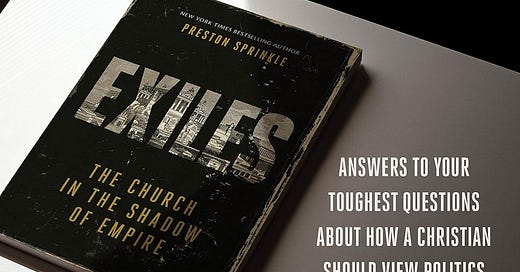Book Review of "Exiles: The Church in the Shadow of Empire"
Preston Sprinkle's newest book is a near-perfect overview of Scripture's perspective on politics.
About a third of the way through Exiles: The Church in the Shadow of Empire (released March 5th, 2024) I found myself getting annoyed. Not because of any errors or problems I found in Preston Sprinkle’s book, which like his other works is remarkably even-handed, generous, and comprehensive. Instead, I found myself getting annoyed because he had done something I thought wasn’t possible: he covered the whole scope of Scripture’s perspective on politics in a way that was succinct, readable, and approachable to virtually anyone.
As someone who’s done a lot of thinking and reading on the topic of politics and Christianity, Preston Sprinkle covered a lot of ground I’m used to–in fact, he focuses the most attention on passages I include in my Politics Bible Study guide. He discusses the Genesis mandate for humans to bear God’s image and to steward the Earth well, as well as the subsequent rise and fall of the prototypical empire of Babel. He traces the uses and misuses of power as the Israelites went from slaves in Egypt, rulers in Israel, to exiles in Babylon. He then explores Jesus’ countercultural approach to the political dilemmas of his day, creating to a new community of believers that was both non-political and extremely political at the same time. Sprinkle’s survey of the Bible then culminates with John’s apocalyptic vision of Rome’s ultimate judgment and God’s Kingdom’s ultimate reign, before giving some brief thoughts on application in contemporary America.
As a fairly short, non-academic work, I wasn’t expected to come across brand new information in this book, particularly because Preston Sprinkle’s main area of professional focus is not politics but rather on Christian perspectives around gender and sexuality. However, his skills as a Bible scholar serve him well, because he keeps exegeting nugget after nugget of Greek words and context that I had never come across before.
To give just one example, he highlights Philippians 1:27a, “Conduct yourselves in a manner worthy of the gospel of Christ.” But in Greek, “conduct yourselves” is actually the word politeuomai, which has the root word of “polis/politics” embedded in it! Philippi had been founded as a Roman colony, with most residents proudly possessing Roman citizenship. Paul is reminding them to instead live out their citizenship as members of Jesus’ kingdom. What immediately follows is the most famous description of how to do that: “have the same mindset as Christ Jesus: 6 Who, being in very nature God, did not consider equality with God something to be used to his own advantage;
7 rather, he made himself nothing
by taking the very nature of a servant,
being made in human likeness.
8 And being found in appearance as a man,
he humbled himself
by becoming obedient to death—
even death on a cross!”
As is probably clear, such a perspective on power and authority is radically countercultural both in Jesus’ day and in ours. Sprinkle shares many little examples like that one that I had never encountered before.
I do have two small critiques of Exiles. The first is that I wish there were a few more personal stories and anecdotes. A different book that accomplishes a similar purpose is Jesus For President by Shane Claiborne and Chris Haw. Jesus For President has loads of stories of Christians both past and present who strove to live out the gospel of Jesus’ Kingdom, and it really helps to expand one’s “prophetic imagination.” Exiles will be an easier pill for most readers to swallow as it is less strident and radical, but it would still benefit from a few more stories.
The other small critique I have is that there are a few places where I wish Preston Sprinkle would go a bit deeper. He covers so many Bible passages in a fairly slim volume, I frequently found myself wishing he would cover them for another page or two. But, I suppose that’s the difference between an excellent overview accessible to a mass audience of Christians, and the type of writing that I do—which frequently veers into the arcane, overly nuanced, and partisan. I suppose the truth of the matter is that I am jealous. Preston Sprinkle has written the perfect introductory book for a Christian looking to (re)build their political theology from the ground up, and I’m a bit in awe of that skill. This is the perfect book for personal discipleship, small groups discussions, or a sermon series. Lord knows American Christians need political discipleship resources like this every year, but an election year is probably the best time to dive into it.




